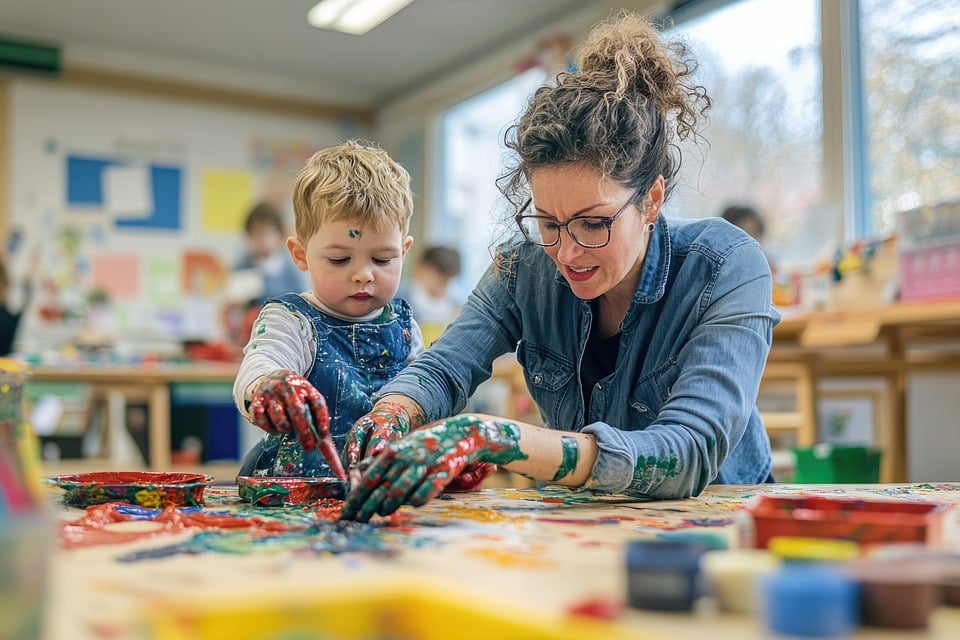Early childhood development is a foundational stage in life that shapes the future of an individual. These initial years, spanning from birth to around the age of five, play a pivotal role in defining a child’s cognitive, emotional, social, and physical development. During this time, the brain is incredibly receptive to learning and adaptation, meaning that the experiences a child encounters are critical in molding their long-term potential. Understanding why child development is so important in the early years provides insights into how we can better foster growth and ensure that each child reaches their full potential.
The Brain’s Growth and Flexibility in Early Childhood
The early years are characterized by rapid brain growth. By the age of three, a child’s brain has reached 80-90% of its adult size. The neurons within the brain are forming connections at a staggering rate, up to 1 million new synapses per second. This remarkable growth explains why early childhood is a prime time for learning.
During this stage, neuroplasticity, or the brain’s ability to rewire itself, is at its peak. This means that early exposure to enriching environments, such as social interaction, play, and problem-solving tasks, fosters optimal cognitive development. Conversely, environments that lack stimulation or are high in stress can have negative, long-lasting impacts on brain development. Ensuring that children have access to positive, supportive experiences is critical for maximizing their potential during this period of heightened sensitivity.
The Importance of Social and Emotional Development
While cognitive growth garners significant attention, emotional and social development in early childhood is equally vital. From birth, children begin to learn about the world through their interactions with caregivers. These initial bonds help a child develop a sense of trust, security, and attachment, which lay the foundation for future relationships.
Children learn to regulate emotions, develop empathy, and navigate social situations through early socialization. Interactions with peers and adults provide essential lessons in cooperation, conflict resolution, and communication. A child who experiences healthy social connections early on is more likely to develop positive self-esteem, resilience, and the emotional intelligence necessary to navigate challenges later in life.
Language Development in the Early Years
Language acquisition is another area that flourishes in the early years. Babies are born with the ability to recognize and respond to sounds, and as they grow, they begin to form words, sentences, and eventually complex ideas. The window for optimal language development is relatively narrow, making early childhood the most critical time for this skill.
Studies show that children exposed to rich language environments, including conversations, reading, and storytelling, develop better vocabulary, grammar, and comprehension skills. A language-rich environment supports the development of literacy and academic success later in life. Caregivers who engage in consistent verbal interaction with children are giving them the tools they need to communicate effectively, both in childhood and adulthood.
The Role of Play in Cognitive and Physical Development
Play is often underestimated in its importance during early childhood, but it serves as a critical tool for learning. Through play, children explore their environment, develop problem-solving skills, and learn to think creatively. Whether it’s building with blocks, playing pretend, or engaging in physical activity, play strengthens cognitive and physical development.
Unstructured play allows children to take the lead, fostering independence and self-regulation. On the other hand, guided play introduces new concepts and challenges, promoting learning in areas like math, science, and motor skills. Through physical play, children also enhance their gross and fine motor skills, which are essential for tasks like walking, running, writing, and using tools.
Encouraging a balance of both structured and free play is key to ensuring that children have the opportunity to develop holistically.
The Impact of Early Childhood Education
Early childhood education programs provide structured environments where children can develop socially, emotionally, and cognitively. Quality early education lays the groundwork for future academic success and emotional well-being. These programs emphasize play-based learning, allowing children to explore new ideas and concepts in a stimulating and supportive environment.
Research shows that children who attend high-quality early childhood education programs are more likely to excel academically, have better social skills, and demonstrate higher levels of self-control and motivation. These children are also more likely to graduate from high school and pursue higher education.
The benefits of early childhood education extend beyond individual success, as communities with access to quality programs see improvements in economic productivity and social cohesion.
The Long-Term Effects of Early Childhood Development
The significance of child development during the early years cannot be overstated. Children who experience positive growth in these early years are more likely to become well-adjusted, successful adults. Conversely, children who face adverse conditions such as neglect, abuse, or a lack of stimulation may encounter long-term difficulties, including mental health issues, academic struggles, and challenges with relationships.
Investing in early childhood development yields returns not only for individuals but also for society. Children who receive adequate support during these years are more likely to contribute positively to their communities, requiring fewer resources in areas like healthcare and social services.
Conclusion: Nurturing the Future
The importance of child development in the early years cannot be understated. During this crucial time, the brain’s capacity for growth is unparalleled, social and emotional skills are being formed, and cognitive and language abilities are rapidly developing. By providing children with the proper environments, education, and care, we ensure that they have the foundation needed for lifelong success.
The role of parents, caregivers, and early childhood educators is indispensable in fostering a nurturing environment. From meaningful play to rich language exposure and emotional support, the right influences during these years can shape the trajectory of a child’s life for the better. Therefore, investing in early childhood development is one of the most impactful ways to promote individual and societal well-being.

